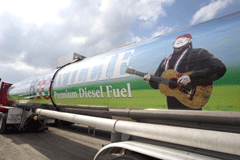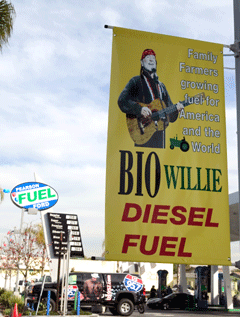Keep on Truckin’
Air Date: Week of October 6, 2006

BioWillie fuel is showing up at service stations around the country, as truckers’ demand for the alternative fuel increases. (Photo: Earthbiofuels.com)
There are now almost five hundred truck stops in the country that sell biodiesel fuel. The eco-friendly fuel blend has become popular among truckers; it’s even getting a push on satellite radio’s trucker station. Shia (SHY-yah) Levitt has our story.
Transcript
CURWOOD: It’s Living on Earth. I’m Steve Curwood. Biodiesel fuel helps fight global warming and has fewer emissions than traditional diesel petroleum. And more and more truckers are getting on the bandwagon. Hundreds of fleets across the nation are now using biodiesel and diesel blends. Producer Shia Levitt hit the road to bring us this report.
[TRUCK SOUNDS]
LEVITT: At Carl’s Corner truck stop south of Dallas, Texas, a handful of drivers are filling up with biodiesel on a windy summer morning. The fuel, made from vegetable oil, is often blended with petroleum diesel at 5, 11 or 20 percent.
LEVITT: The number of truck stops with biodiesel increased close to 40 percent within the last year -- to more than 480 today. Carl’s Corner is relatively well-known among truckers since it was the first to carry Willie Nelson’s biodiesel brand, BioWillie. Owner Carl Cornelius says it was Nelson himself who convinced him to start carrying the fuel.

BioWillie fuel is showing up at service stations around the country, as truckers’ demand for the alternative fuel increases. (Credit: Earthbiofuels.com)
[SOUND OF FUELING UP]
LEVITT: Biodiesel can go directly into any tank that takes diesel fuel. To some environmentalists, its diesel’s green alternative since it can be made from renewable sources like soybean oil or waste products like used cooking grease. But ecological benefits aren’t necessarily what’s attracting truckers like Don Jallo and Bob Call.
JALLO: I'm a farmer too, so that’s another reason.
CALL: Anytime you can do anything for the family farmer that's a plus. Help the trucking industry there's another plus. Get out from under OPEC and the oil company, they're making billion dollars of profit better than they ever have in the whole existence of life, you know, there's no sense in that.
LEVITT: Carl Cornelius says the BioWillie company aims to benefit farmers by buying their crops.
CORNELIUS: Willie wants to put 50,000 farmers to work in Texas alone we put some of the family farmers back to work guaranteeing them a price, do away with foreign oil and we can stop some of the wars maybe.

(Photo: Earthbiofuels.com)
VERRY: Before, it was always kind of a tough sell, but in the last couple years it's really turned around. At the largest truck show in the country, that’s the Mid-American Truck Show in Louisville, Kentucky, 17 percent had tried it in ‘05, and in 2006, 40 percent had tried it. That’s quite a jump in one year far as truckers’ usage of biodiesel
LEVITT: Verry has been on the road a lot lately, talking to fleet owners and drivers at conferences and truck shows. And truckers are also hearing about the fuel from another source-- legendary country music DJ Bill Mack. Mack constantly promotes it on his live call-in program on XM satellite radio’s trucker station, Open Road.
MACK: It’s going to do a lot of good. And that’s what the biodiesel is about is getting those prices down. Manufacturing here in these United States, getting away from dependency from the Middle East or anywhere else.
LEVITT: The Bill Mack Show is on air for four hours every weekday, and on Wednesdays he’s joined for an hour by longtime friend and country music star Willie Nelson.
[BILL MACK AND WILLIE NELSON TALKING]
LEVITT: While the publicity has produced some new customers from among the truck-driving fans, the biodiesel industry has still had to face some uphill challenges to its public image. After Minnesota mandated two percent biodiesel at all its diesel pumps, some fuel sold there turned out to be sub-standard. Some batches gelled in cold-weather or caused fuel filters to clog, and many northern drivers became skeptical about trying the fuel. Verry says these are merely growing pains of an industry in its infancy.
VERRY: We’re growing so rapidly that we found we did have some out of spec biodiesel going into the market, so we had to come together to address that issue and continue to keep consumer confidence high in the fuel.
LEVITT: The largest trucking trade organization in the country, the American Trucking Associations, recently announced their endorsement of biodiesel blends up to five percent – as long as the fuel meets quality standards. This represents a huge shift in policy says ATA’s Rich Moskowitz.
MOSKOWITZ: Five years ago there were a lot of rumors out there that it would cause long-term damage to the engines that it would result in drastic fuel economy reductions and as a result the industry was adamantly opposed to its use.
LEVITT: Recent tax incentives made biodiesel more cost competitive for trucking companies, some of whom see it as a way to expand the fuel supply. Last year, SYSCO Corporation, for example, owner of the largest private corporate fleet in the country, started using biodiesel fuel in 400 of its vehicles. Company representatives say the results have been positive so far and they’re hoping to expand their use as the fuel becomes more available. Biodiesel production and consumption in the U.S. tripled between 2004 and 2005. It’s likely to double again by the end of this year. But Rich Moskowitz points out it’s still only a small fraction of the diesel market.
MOSKOWITZ: The biodiesel industry themselves has forecasted that they would reach one billion gallons productions by 2015. One billion gallons of biodiesel is essentially 2.7% of what the trucking industry consumes in a year.
LEVITT: New research by the Department of Energy's National Renewable Energy Lab now suggests that biodiesel blends of up to 20 percent may actually be no worse in terms of Nitrogen Oxide emissions than regular diesel, contrary to what was initially thought. NOX emissions are among the precursors to ozone. Biodiesel compares favorably with diesel fuel for other pollutants like CO2, the major climate warming gas and dangerous particles that can cause asthma and other respiratory problems.
Still, Verry says truckers’ biggest question about biodiesel is where to get it. The National Biodiesel Board recently launched a website and in August launched a 24-hour trucker hotline to help drivers find fueling sites near them. For Living on Earth, I’m Shia Levitt.
Links
Living on Earth wants to hear from you!
Living on Earth
62 Calef Highway, Suite 212
Lee, NH 03861
Telephone: 617-287-4121
E-mail: comments@loe.org
Newsletter [Click here]
Donate to Living on Earth!
Living on Earth is an independent media program and relies entirely on contributions from listeners and institutions supporting public service. Please donate now to preserve an independent environmental voice.
NewsletterLiving on Earth offers a weekly delivery of the show's rundown to your mailbox. Sign up for our newsletter today!
 Sailors For The Sea: Be the change you want to sea.
Sailors For The Sea: Be the change you want to sea.
 The Grantham Foundation for the Protection of the Environment: Committed to protecting and improving the health of the global environment.
The Grantham Foundation for the Protection of the Environment: Committed to protecting and improving the health of the global environment.
 Contribute to Living on Earth and receive, as our gift to you, an archival print of one of Mark Seth Lender's extraordinary wildlife photographs. Follow the link to see Mark's current collection of photographs.
Contribute to Living on Earth and receive, as our gift to you, an archival print of one of Mark Seth Lender's extraordinary wildlife photographs. Follow the link to see Mark's current collection of photographs.
 Buy a signed copy of Mark Seth Lender's book Smeagull the Seagull & support Living on Earth
Buy a signed copy of Mark Seth Lender's book Smeagull the Seagull & support Living on Earth

